Девиантность, преступность, социальный контроль в обществе постмодерна - [90]
The bandit operated fully confident in his impunity. Besides him there were many others involved in this activity wich lasted for 20 last years in the large cossack village Kuschevskaya, and in nearby areas, where the gang was known as „capoks“ – an organized criminal group (OCG) whose name comes from the surnames of its founder. They robbed, terrorized beat, and killed. After all these murders were obviously not the first for this OCG – in Kuschevskaya alone there are many unsolved murders, including the murder of the farmer Valeria Bogacheva, murderof the members of the local administration of Boris Moscovitch. The leader of the gang – Sergey Capok (some versions of the story say he was a murder on request) was „expensive“ in the region. He was a deputy of Kuschevskaya region. The Gang of Capok begain its operations in the 90s. This is a criminal organization with branches in many cos sack villages of the region also in possession of several legal business – a scattered network of farms, safety structures, where the group's personnel prepared the instructors of the special police».
In the Republic Bashkortostan criminal organization influenced the chief of the department of special expert operations – expert of criminal law centre under the republican Ministry of Internal Affairs (MVD) Leonid Dayanov, who created the criminal community for drug trafficking involving 15 people.
The criminal community of thieves thenexplanded to St. Petersburg encompassing about 40 persons, six out of whom were policemen.
In Chelyabinskaya area a large OCG involved in insurance fraud was exposed (32 persons, out of whom 11 persons were militia officers). They prepared forged documents, in which they stated that there had been a car accident, and as a result they got the damages for the car. The documents were given to insurance companies for the purpose of collecting the payments.
Gennady Gudkov, deputy head of Committee of Security of Gosduma (Russian Parliament – Y-G), a retired colonel of FSB wrote to the «Russian Newspaper»: «Crime in large cossack village Kuschevskaya has shown not only the crisis of the law-enforcement system, but also the crisis of authorities… All gangs exist only because they are protected („cryshuet“) by the law-enforcement organs».
Writer D. Bykov asked:
«Why did the landlords of Kuschevskaya become criminals? Why the governor of the region Mr. Tkachev, did not undertake any measures to overcome this situation? Why did thirt five thousand people silently tolerate the robberies, the rapes, the stealing? Why did one hundred twenty million people, including children, peacefully and silently accept that they were deprived of the basic rights, liberties, hope, incentives, culture, and even freedom of thought? They were all afraid, but there is no one power, especially in the present, capable of inciting such terror. They were afraid that against such power all efforts were pointless and useless. Generally speaking, all these people were certain that the way things are is they way things must be. That Russia has not changed and cannot change. Their fear is not of the sheer terror spread by the bandits or even of their power. It is founded in deep internal consciousness that a society which has undergone any change will always be built in the same way. And they do believ that after the final meeting of the committee Gosduma (Russian Parliament – Y.G.) on safety a new gang, a new S. Capok, will appear in large cossack village Kuschevskaya, perhaps this time with the blessing of the highest powers in the country». (Profil, 22.11.2010).
On 27>h November 2010 in Engelsky region in the Saratovskaya area ten participants of organized criminal community were detained. They had com-mited many felonies, including murders in the 1990s, at the request chapters of the head of the administration of the region, Michail Lysenko. Other representatives of the administration of the region also took part in the activities of the organized criminal group. The group was also well armed (http://news.mail.ru/incident/4860592/).
The advisor of the chairman of the Constitutional Court of the Russian Federation, a retired general-major of the militia, Professor Vladimir Ovchinsky spoke on the radio «Liberty» on 19 November 2010: «The situation with organized forms of criminality is critical… If in 1990s organized criminal groups struggled for power, they now control the authorities from the inside». The Head of the Central electoral commission of Russian Federation, Mr. Vladimir Churov, has said recently: «the attempts of the criminal structures go as far as to get their candidate onto the election list and even to participate in the electoral commissions».
Moreover, the Ex-President of the Russian Federation Mr. D. Medve-dev spook about «the joining of the police bodies and organs of power with the criminal world»[497]. And the Chairman of the Constitutional Court of Russia Prof. V. Zor'kin write: «the joining of the authorities with crime… is not unique… Our state will change from being criminalizing to being criminal»
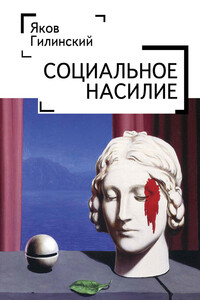
Войны и насильственная преступность сопровождают человечество всю его историю и давно служат предметом изучения историков, политологов, юристов, социологов. А вот «воспитательное насилие», экономическое насилие, насилие в спорте, религиозное насилие, насилие государства против своих граждан стали объектом специального исследования лишь в ХХ веке. В предлагаемой монографии автор высказывает свою точку зрения на социальную природу насилия и его различных проявлений.Книга может представить интерес для философов, политологов, социологов, юристов и всех, интересующихся проблемой насилия в обществе.
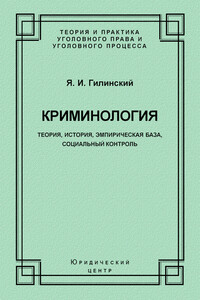
Предлагаемая вашему вниманию книга – второе, переработанное и дополненное издание монографии известного ученого-криминолога, которое может служить учебником криминологии для студентов и аспирантов. Первое издание вышло в 2002 г. и давно стало «библиографической редкостью». Автор излагает кроме общепринятых свои собственные представления о науке криминологии, преступности, ее видах, а также о реакции общества и государства на преступность. Может быть рекомендована студентам, аспирантам, преподавателям криминологии, а также всем, кто интересуется проблемой «преступления и наказания». 2-е издание, переработанное и дополненное.

В своей публикации мне хочется обратиться к открытиям исследователей российской истории, создателей «Новой хронологии» А.Т.Фоменко и Г.В. Носовскому (в сокращении: ФН), уже не один год будоражащим российское общество, которое, тем не менее, вовсе не проникается к ним заметной благодарностью.Скорее наоборот: смелые и даровитые приверженцы истины получают болезненные упрёки от обывателей и записных академиков то в фальсификациях и подделках, то в дилетантизме и жажде денежной поживы.

Текст классика современного психоанализа, в «популярной» форме резюмирующий основные принципы его дискурсивной практики примени¬тельно к различным областям повседневного человеческого существования.

В книге рассказывается история главного героя, который сталкивается с различными проблемами и препятствиями на протяжении всего своего путешествия. По пути он встречает множество второстепенных персонажей, которые играют важные роли в истории. Благодаря опыту главного героя книга исследует такие темы, как любовь, потеря, надежда и стойкость. По мере того, как главный герой преодолевает свои трудности, он усваивает ценные уроки жизни и растет как личность.
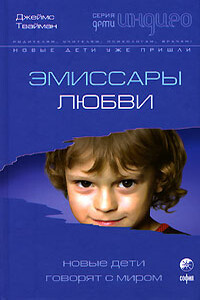
Хотя эта книга читается как увлекательный роман, его содержание — необычный личный опыт Джеймса Тваймана, сопровождавший его знакомство с Детьми Оз — детьми с необычайными психическими возможностями. Объединяет столь непохожих между собой детей вопрос, который они хотят задать каждому из нас. Приключение, которое разворачивается перед нами, оказывается не просто увлекательным — вдохновляющим. И вопрос этот способен круто повернуть жизнь каждого человека на этой планете.О чем же спрашивают нас эти дети?«Как бы выглядел наш мир, если бы мы все немедленно, прямо сейчас осознали, что все мы — Эмиссары Любви?»Такую книгу вы захотите подарить вашим друзьям — не только взрослым, но и детям тоже.
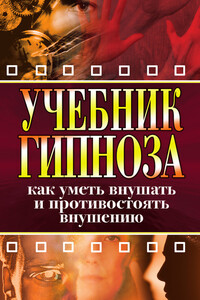
Книга, которая лежит перед вами, познакомит с историей гипноза, тайнами сознания и подсознания, видами внушения, методикой погружения в гипноз, углубления гипнотического состояния и выхода из транса.
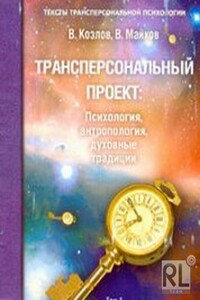
Книга является первым в России историческим очерком трансперсонального проекта в российской культуре. Авторы книги, доктор психологических наук, профессор Владимир Козлов и кандидат философских наук Владимир Майков, проанализировали эволюцию трансперсональной идеи в контексте истории психологии, философии, антропологии и духовных традиций.Во втором томе исследуется русская трансперсональная традиция и выявляются общие характерные особенности трансперсональной парадигмы в России и трансперсонального мировоззрения нашего народа и великих российских мыслителей.